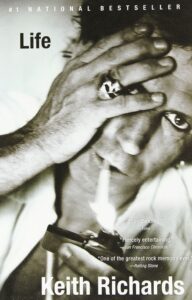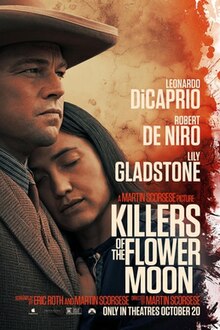This week’s selected media: February 18, 2024: Keith Richards’ Life, Killers of the Flower Moon
This week I finished:

Life, by Keith Richards: I’d meant to read this book since seeing it on shelves a few years ago. Bruce Springsteen’s memoir prompted me.
As with Springsteen, Richards’ experience after connecting with the guitar resonated with me most—discovering the art, the craft, self-expression, awareness, connecting with other musicians listening to their recordings, meeting other musicians in person, and so on. I don’t think I’m flattering myself to say I’m connecting with them as artists developing something nobody has seen before but knowing that the world will love it, that they crave it. My book Leadership Step by Step identifies leadership as a performance art where we express ourselves to evoke emotion in our audiences and to change them in ways they value, connecting on some universal emotion. Sustainability leadership being a subset of leadership in general is also a performance art.
Seeing how Bruce and Keith went from nothing, teaching themselves something nobody had seen or heard before, learning from masters as best they could, devoting themselves to their craft, developing visions for a result no one else could have imagined, working intimately with teammates, and sticking with their missions for decades in the face of misunderstanding and resistance inspires me and makes me feel connected with them.
Killers of the Flower Moon, Directed by Martin Scorcese: With Scorcese, de Niro, and DiCaprio, the movie had great directing, acting, and art. It prompted me to read more about the book, the Osage Murders, and the tragic lack of justice.

I think most people saw the murderers as bad people, some conflicted, and the white people as bad white people. I wish my book were out so I could refer to it for my perspective, which is that the individuals were acting within a culture of imperialism driven by unsustainability going back thousands of years. Living unsustainability means you need more than your environment supplies, which mean you will take from others. That’s imperialism and unsustainability drives it.
Then I ask myself how different we are. We’re less cruel than the murderers, but put aside the mechanism of killing. Nine million people die per year breathing polluted air, a huge body count, and whatever rationalizations and justifications we offer, we contribute.
David Grann, who wrote the book the movie is based on, saw this pattern about it being about a system, though I don’t know if he traced the history of the system to its origin. My next book covers it, so read it when it comes out. Here’s what Grann said:
I thought I was writing a book about this singular evil figure who had been apprehended by the FBI,” says Grann. “Instead, I began to realize that this was less a story about who did it and who didn’t do it. It was really about a culture of killing and a culture of complicity, … [with] many of these murders carried out by individuals who were profiting from this very corrupt system of targeting the Osage, often marrying into their families and then plotting to kill them to steal their oil money and inheritance.
Read my weekly newsletter

On initiative, leadership, the environment, and burpees
Pingback: This week’s selected media, November 30, 2025: Led Zeppelin, Greenwashed, Fugazi: Instrument » Joshua Spodek